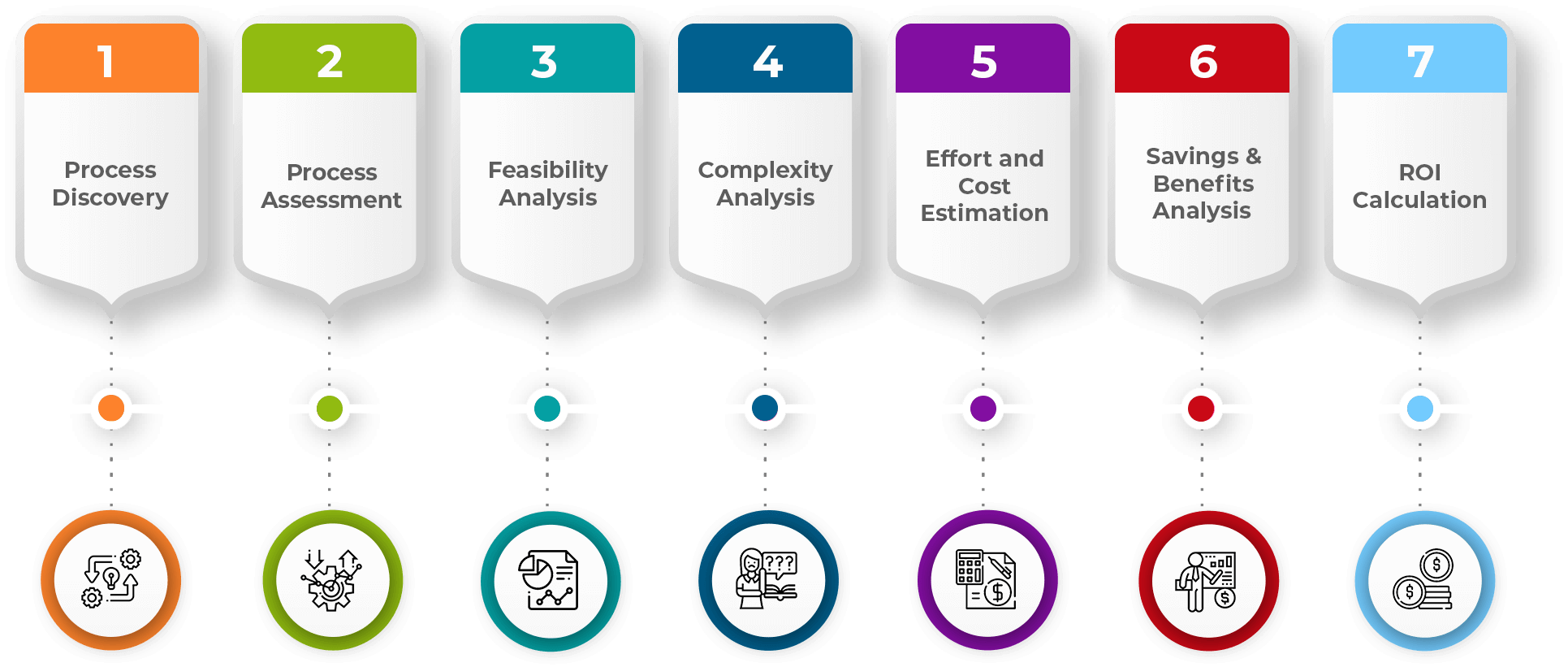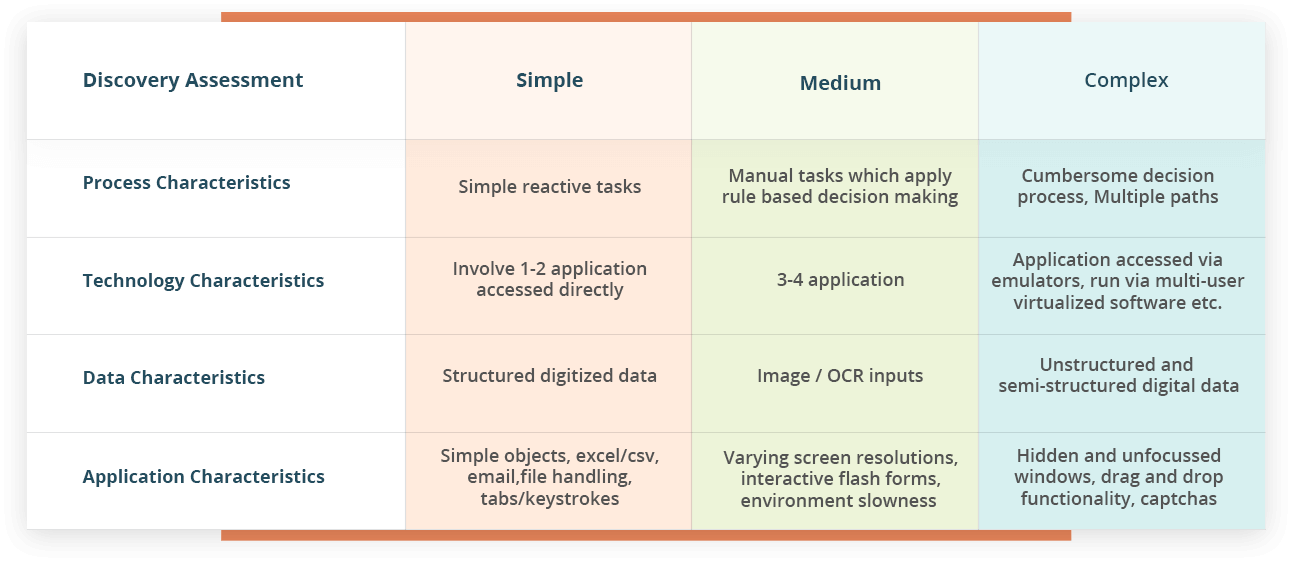
Automation Consulting
Process Automation Solutions for Your Organization
Get a QuoteA systematic approach leaves no room for gaps in requirements understanding and we conduct a series of workshops with business process owners for the business areas that can be considered for automation. Based on the process depth, technology used, data structure and the application characteristics, we derive the complexity levels for Process assessment.
Is your organisation facing any of the below?
-
Why are the resources
over-burdened? -
Are they able to deliver
on time with accuracy?
-
Are the enterprises able to
scale up to the expectations in
process optimization? -
Are processes
person dependent?
If the Answer isYes
Techonk Software has put a step forward to introduce Robotic Process Automation in place to answer all these questions.
Robotic Process Automation is
-
Designed for business users
Creates bots in minutes/hours
Operationalize in days/weeks
Low upfront investment
ROI in 3-6 months
Techonk Software is the Business partner with Automation Anywhere and UiParth, in proving the platform for Robotic Process Automation.Techonk Software has been recognized as the Centre of Excellence by RPA Global Leader, Automation Anywhere.
RPA, Robotic Process Automation is the phenomenon of Software Bots working on routine, highly voluminous repetitive manual tasks normally performed by the humans. In many enterprises processes are loaded with resource burden with daily mundane tasks. Why these business processes are resource burden? Empower your employees with Digital Workforce. RPA helps businesses more scalable and with happy customers.
Techonk Software & Automation Roadmap
We research and identify the process that requires automation and provide you the best out of your processes and resources. We develop close knitted strategy for RPA implementation envisaging specific objectives like Security, IT infrastructure, and governance and change management protocols. Our domain experts assess and identify processes suitable for automation within the Organisation and provide support to the regularization of identified processes.
A well-defined RPA Roadmap helps organisations to decide on RPA Implementation. Our RPA Experts pave the roadmap considering two main aspects (1) Process Identification within the Organisation (2) Prioritization of identified processes.
After identifying the processes for automation we perform feasibility study, evaluate the complexity of each identified process, cost & Effort estimation of each process and develop equation for cost savings on RPA implementation thereby, Process Prioritization is done based on various studies conducted to derive Return on Investment.
Process Identification
Identification of Processes that can be automated
High level Benefit Analysis
List and weigh the business priorities
Process Prioritization
Prioritize identified processes
Process analysis, assessment and feasibility study by our RPA experts lays strong foundation for the RPA Implementation. Process walk-through with different process owners within the Organisation and interviews help us to perform feasibility study with predefined, trusted equation to derive the feasibility equation. Based on the Feasibility Index, we decide whether the Process is eligible for automation or not or is it possible with some challenges.

Process Discovery & Process Assessment
A systematic approach leaves no room for gaps in requirements understanding and we conduct a series of workshops with business process owners for the business areas that can be considered for automation. A systematic approach leaves no room for gaps in requirements understanding and we conduct workshops with business process owners to derive process automation use cases.

Our functional RPA Experts conduct process walk- through with SMEs and identifies a couple of use cases for pilot run. Pilot run incurs minimal investment and can be implemented quickly to assure the RPA capability. Our practical approach enables us to realize the business use case automation.
Based on Process study input metrics, volume of data Complexity Calculator generates development estimates and standardization estimates.
Process prioritization is done based on the manual hours spent, number of resources working, departments involved, technology landscapes, information silos, process steps, data size, business logic, deployment and standardization.
Feasibility Analysis
Feasibility analysis is conducted based on number of employees working on specific task. Higher the number of employees working on process, highest the priority. So, High number of FTE (full time employee equivalent) become high priority for automation.
Structured rule based data processes with defined business rules become good candidate and takes less time to automate process. It is easy and quick to process structured digital data.
Processes with frequent changes & processes with high cycle time reduce the probability of automation.

Above-mentioned criterion will help in recognizing the process whether it can be automated using a standard RPA tool. Complex processes, which involve judgmental calls or decision-making, or require human intervention, get eliminated from analysis.
Techonk Software expedites feasibility of specific process considering the data collected during the discovery /process walk-though.
Complexity Analysis, Effort and Cost Estimation
After completing the feasibility study, on high level the next step is to estimate the complexity of selected processes to automate.
We have developed a complexity calculator to estimate the complexity of identified process.
After finding the complexity index, the model compares to the automation cost and effort for each process.
Savings & Benefits Analysis
We estimate FTE Savings for each process considering prevailing FTE count and determining the % of automation possible. FTE Savings are calculated.
Apart from manual hour’s savings, there are significant savings as follows:
- Reduced Errors
- Business agility
- Employee productivity
- Regulatory compliance
ROI Calculation
Business priorities are defined based on the saved manual hours, quality improvements in terms of reduced errors, streamlining critical processes; improve employee morale and adherence to regulatory compliances.
Business Priorities
Enterprises focus on many factors for automating any task. Techonk Software takes care of the business priorities while conducting the high level benefit analysis with Organisation. It includes following factors that can be taken into consideration for business point of view:
Save manual hours
Improve Quality
Streamline mission critical processes on high priority
Improved employee experience
Improve customer satisfaction
Adhere to regulatory compliance
After identifying the process, we get basic information i.e., percentage of work that can be automated and a draft estimation of the complexity is generated. Information of manpower working on task/process, number of hours and average pay and tasks re-occurrence, this type of data is collected. We conduct high level benefit analysis considering above mentioned business priorities. Derive complexity of the process using complexity calculator. Finally we provide the equation of high priorities, annual savings in terms of hours and dollars. Effective implementation of RPA helps your Organisation save time and costs.

By implementing Robotic Process Automation, employees can spend more time in creative tasks and the enterprises can achieve much efficiency in completing tasks and gain a giant leap with ROI in 3-6 months.
Do you want to connect with us?
![]()
Confidential & Secured
- This form is Secured with Validations.
- Your Privacy is our utmost priority.
- We will not reveal any of your info.
- It will be used to contact you for Project purpose only.


 www
www